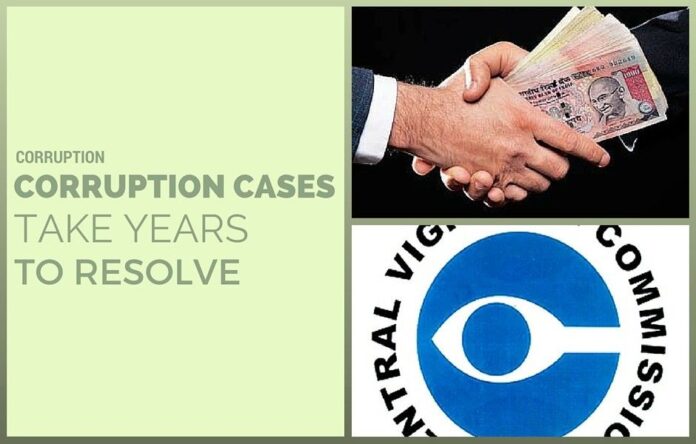
PerformanceGurus Staff
New Delhi
Judicial delay alone is not responsible for settling corruption cases in India, but Government machineries are also suffering from the same inertia. According to a latest study conducted by the country’s corruption watchdog—the Central Vigilance Commission— it takes at least eight years for finalization of a corruption case against a government employee.
The study was conducted by a three-member CVC team of Keshav Rao and Nitish Kumar (both CVC Directors) and M. A. Khan, Under Secretary. The brief of the panel was to “Study of Existing Pattern of Prolonged Disciplinary Proceedings and Suggestions for Remedial Action”.
The study has flagged lack of manpower as one of the main reason for delay in disposal of cases.
At least 5000 corruption cases are referred to the CVC every year. Many of these cases turn out to be `false’ and `flimsy’ but such prolong delay impacts the career opportunity of the officer or staff under the scanner.
“On an average, it takes more than eight years for finalizing a major vigilance case from the date of occurrence of irregularity, whereas detection of irregularity takes on an average more than two years,”
– CVC Study
The study said that it takes almost two years for finalizing the preliminary investigation for the First Stage Advice (FSA) on the basis of which the a decision is taken on the fate of the complaint. Thereafter, the concerned Government Department takes about five months to take call on the FSA. If a probe is set up, the inquiry office takes at least 15 months to complete his investigation.
“Findings also reveal that the average delay on part of Inquiry Officers is significant and to the tune of about 1.3 years and, if this delay is clubbed with investigation at first stage, it goes up to 3.4 years. That clearly requires suitable interventions at the level of investigation both at first and second stage,” the study said.
Calling for the timely disposal of disciplinary cases, the study said:
“Disciplinary matters, perhaps, are among the most litigated branches in India. It is very important to emphasize the disposal of disciplinary cases in a timely manner so that neither an innocent official is penalized nor a guilty official allowed going scot-free. Due to pendency and continuous delay in disciplinary action, cases remain undecided. This requires urgent attention.”
CONCLUSIONS OF THE STUDY
- Disciplinary matters, perhaps are among the most litigated branches in India. It is very important to emphasize on disposal of disciplinary cases in a timely manner so that neither an innocent official is penalized nor a guilty official is allowed to go scot free. Due to pendency and continuous delay in Disciplinary Action, cases remain undecided. This requires urgent attention.
- The above study clearly indicates that there is a need to look into the aspects of delay at the level of Administrative Departments. Various factors (endogenous as well as exogenous) might be affecting the timely disposal of cases in the Departments and it is felt that Departments should be asked to re-engineer their internal processes for finding reasons of the delays and possible remedies thereof. It is felt that one of the factors responsible for this may be deployment of limited dedicated manpower for this job.
- In so far as CVC is concerned, though the proportion of delay on its part is relatively small, there is room for improvement in this area. On examination of Input-Sheets, it was observed that there are some gaps in the input sheets. It is recommended that input sheets be made part of noting page of the file and must be completed before submitting the file to the Branch Officer.
- By and large, the findings of the study provide quantitative assessment with relative magnitude of the delay in vigilance proceedings at various stages and are expected to serve as a valuable input for aligning the existing intervention strategies by focusing more on areas requiring attention. Since the areas of concern have been identified, interventions can be more precise.
With courts taking a decade or more to wind up high profile corruption cases and government departments its internal vigilance wings showing no more alacrity in dealing with the menace of corruption, it is not surprising that India is ranked 85th among 175 countries on global corruption ranking as per a report of the Transparency International.
- Subramanian Swamy approaches Supreme Court on Govt’s modification of 2G Scam Judgment to avoid auction of Satellite Spectrum - April 23, 2024
- Defence Minister Rajnath Singh visits Siachen. Reviews military preparedness - April 22, 2024
- Amit Shah’s shares in the Stock Market almost doubled in the past five years - April 21, 2024










